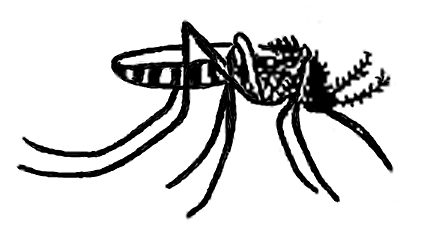by Dave Tamayo,
Trustee Sacramento-Yolo Mosquito and Vector Control District

West Nile Virus (WVN) has been in the news a lot recently, especially since it appeared in Southern California last year. It is almost certain to arrive in Sacramento this year. Since WNV is spread to humans by mosquitoes which breed in water, it helps to know how this relates to local urban creeks.
According to David Brown, the General Manager of the Sacramento-Yolo Mosquito and Vector control District, our local urban creeks are not usually a significant source of mosquitoes because they need still water in which to breed. Most creek habitat is not suitable for them because it is flowing. However, creeks can become a problem under certain conditions. As creeks dry out in the summertime, isolated pools stangnate and become excellent mosquito habitiat. Mosquitoes breed in pools that form behind debris dams or other obstructions. Finally, mosquitoes favor water with lots of organic matter, which occurs when lawn clippings and other yard waste is deposited in the storm drain system or directly into creeks.
District staff proactively control many of the potential mosquito hot spots in our community with methods such as mosquito fish, draining problem sites, applying insect growth regulators, and applying a bacterium that is specific to mosquito larvae. If you notice a section of creek that contains a lot of mosquito larvae, you can help by contacting the District. Whether or not you live near a creek, if you have a problem with mosquitoes in your yard or neighborhood, you can call the District for help in identifying and controlling the source.
It is important for the public to help eliminate mosquito breeding sites. Mosquitoes lay eggs in any standing water, and development from egg to adult can take as little as three days. Ponds, puddles, and bird baths are obvious breeding sites. But rain gutters, tree holes, wheelbarrows, flower pots, dog dishes, unmaintained spas and pools, and even plastic sheeting can harbor mosquitoes.
Effective mosquito control in the United States has been very successful at almost completely eliminating diseases like malarria that used to be common. By working together to proactively control mosquitoes while they are in their larval stage, the District and the public can greatly reduce the threat of WNV and the need to spray pasticides to kill adult mosquitoes.
Call the District at (916) 685-1022 or visit their website: www.sac-yolomvcd.com
This article originally appeared in our Summer 2004 Newsletter